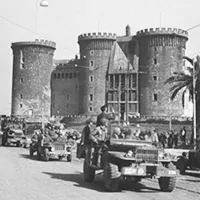Published:
Author: Antonio Maria Guerra
Neapolitan Fried Pizza
HISTORY, INFO, PLACES, INTERESTING FACTS

Although there are many kinds of fried pizza in different parts of the world, the one from Naples has quite distinctive characteristics, in great part related to the particular nature of the city. Let’s find out the history of Neapolitan fried pizza, its places, how it’s made, its variants and the historic ‘friggitorie’ where you can enjoy its original taste.

The history of Neapolitan fried pizza.
The method of frying to cook food has thousands of years of history: it was well known to both the ancient Egyptians and the Romans. It’s therefore not surprising that specialties similar to fried pizza can be found all over the world and especially in Italy. That said, it’s undeniable that the Neapolitan fried pizza has a particular charm, the result of its close connection with the ‘City of the Sun’. The great success of this delight for the palate began after World War II when, due to the high cost of the ingredients and the lack of wood-burning ovens (mostly destroyed by bombing), people were forced to find a valid alternative to the ‘classic’ pizza. An alternative that had to be just as tasty and, at the same time, very cheap.
That said, it’s undeniable that the Neapolitan fried pizza has a particular charm, the result of its close connection with the ‘City of the Sun’. The great success of this delight for the palate began after World War II when, due to the high cost of the ingredients and the lack of wood-burning ovens (mostly destroyed by bombing), people were forced to find a valid alternative to the ‘classic’ pizza. An alternative that had to be just as tasty and, at the same time, very cheap.
So It was that plebeian women, in their houses located at street level (the ‘Bassi’ or ‘Vasci’), began to prepare a simple dough, made with flour, water, oil, yeast and salt. Once grown, portions of this dough were cooked in boiling oil and sold to passers-by using stalls placed on the sides of the ‘vicoli’ (*1).
The ‘people’s pizzas’ (‘pizze del popolo’), as they were nicknamed, were large (the frying made them swell), tasty, and, above all, cheap. The last feature, in particular, was of fundamental importance, especially in times of crisis. It’s, therefore, no coincidence that they were frequently sold on credit, using the formula (*2) ‘a ogge a otto’, that is to say, ‘in eight days’. After the crisis period, fried pizzas began to be stuffed with different types of filling: the most classic being the one made with Cicoli (*3), black pepper and ricotta cheese.
In Naples, there are still several places, started by the children and grandchildren of the women we have talked about, where it’s still possible to taste the traditional fried pizza.
Notes:
*1: ‘Vicoli’: the narrow alleys of the historic center of Naples.
*2: It was, after all, a form of marketing ante litteram.
*3: The ‘Cicoli’ or ‘Ciccioli’ are pressed cakes of fatty pork.
Naples: the birthplace of fried pizza.
Naples, the renowned ‘city of the sun’ is the provincial capital of the Italian Region of Campania. Its origins are generally traced back to the 8th century B.C., at the time of Magna Graecia.

De Sica, ‘The Gold of Naples’ and fried pizza.
Fried pizza is one of the most typical specialties from Naples: it’s possible to say that, in a way, it sums up its spirit. It’s, therefore, no coincidence that the famous Italian director Vittorio De Sica gave it a pivotal role in his movie ‘The Gold of Naples’, considered by many experts his tribute to the city.

The variations of fried pizza.
In Naples there are many specialties closely related to the ‘classic’ fried pizza. Here follows a brief description of each of them, from the simplest one, the ‘zeppola’, to the most complex, the ‘calzone’:
 Zeppola:
Zeppola:
‘Zeppola’, also known as ‘pasta cresciuta’, is the simplest type of fried pizza. It’s quite small and is prepared by frying for a short time a little piece of dough, made with flour, water and yeast. The only seasoning is salt. Together with the crocchè, it’s one of the most classic Neapolitan street foods.
 Classic Neapolitan fried pizza:
Classic Neapolitan fried pizza:
The classic fried pizza is just a larger version of a zeppola. They share the same ingredients. Its dough is usually flattened by hand before frying.
Once again, the only seasoning is salt.
 Montanara:
Montanara:
‘Montanara’ is much more elaborate than the classic fried pizza. The main differences are two: the first is that it’s seasoned with tomato, provola cheese, parmesan and basil. The second consists of a slightly different cooking procedure: once its dough is fried, its cooking continues in the oven.
 Fried calzone:
Fried calzone:
The stuffed fried pizza is also known as ‘calzone fritto’ (fried ‘calzone’).
Its dough is flattened by hand, garnished and folded. This sort of ‘pouch’ (its dimensions may vary), is then fried and served. The most typical Neapolitan fried calzone is filled with just ricotta cheese and seasoned with black pepper.

Calories and nutritional values.
One hundred grams of Neapolitan fried pizza provides roughly 300 / 350 kcals. The specialty includes fat, carbohydrates, sugars, protein, and sodium (in this order).

Where to eat the original Neapolitan fried pizza.
It’s quite difficult to determine which is the most ancient friggitoria in Naples. Until we find it out, please refer to the following list including some of the most traditional places where you can savor fried pizza prepared according to the original recipe:
- Pizzeria ‘De’Figliole’
Via Giudecca Vecchia, 39, 80139 Napoli; - Pizzeria ‘De’Figliole’
Via Giudecca Vecchia, 39, 80139 Napoli;
Tel. +39 081 286721 - Pizza Fritta da Fernanda
Via Speranzella, 180, 80134 Napoli;

Neapolitan fried pizza: ingredients.
To make a fried calzone, the dough (the same used for classic pizza) is rolled, stuffed, and closed. The final step is cooking it in hot oil.
The following ingredients are used to make the dough:
- Water;
- Flour;
- Fresh yeast;
- Extra virgin olive oil;
- Salt;
There are many types of filling. Some examples:
- Ricotta;
- Ricotta and provola cheese;
- Ricotta, salami and provola cheese;
- Ricotta and ‘cicoli’;
- Ham and mozzarella cheese;
- Mushrooms, ham and mozzarella cheese;

The right beverage.
What to drink with a delicious Neapolitan fried pizza?
A good choice is a red wine, quite fresh, quite tannic, medium warm and medium sparkling. For example, a Gragnano or a Lambrusco di Sorbara.
- Their acidity and effervescence balance the sweet tendency of the dough.
- Their tannicity and alcohol balance the greasiness of the frying.

Copyright information.
The images displayed in this page belong to WebFoodCulture, with the exception of:
Public domain images
- US Army soldiers arrive in Naples, 1943. (Wikipedia Link)
- Vittorio de Sica (Wikipedia Link)









